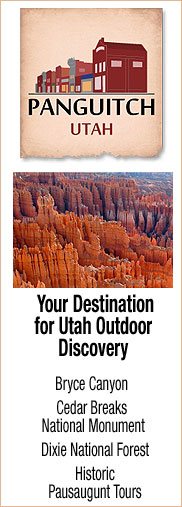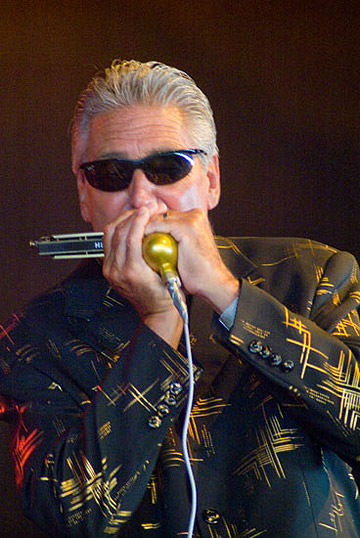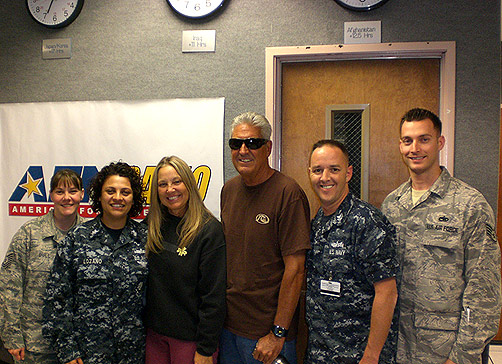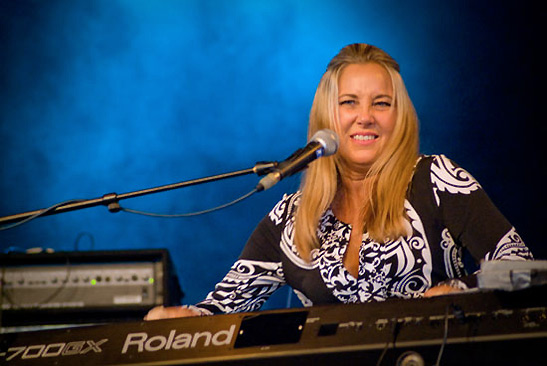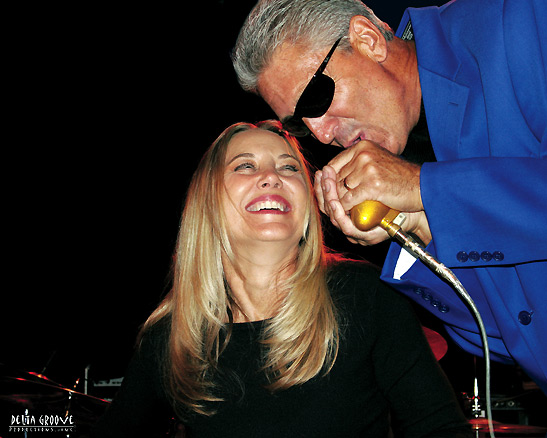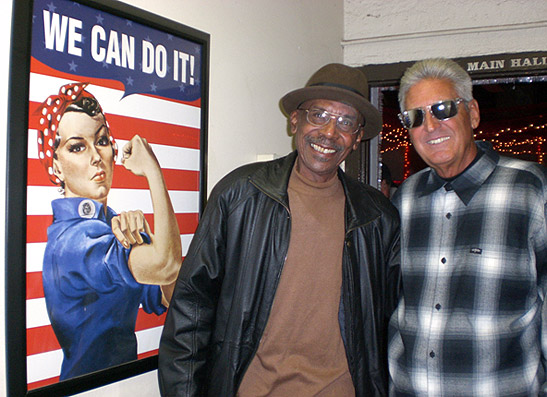 |
 |
|
 |

|
Rod
Piazza... and the Mighty Flyers
No, my most lasting memory was reaching out to snatch up my beer just a downbeat before a Rod Piazza, size 15 Florsheim thumped down on the bar right in front of me. The man was hunched forward and blowing the chrome off that harmonica. As house lights glinted through ever-present Ray Bans, Piazza was on a 'search and destroy' mission as he continued to high-step his way through a Flyers' anthem, 'Low Down Dog.' And like every other patron gripping the mahogany rails that evening, I just stood there clutching my draft, staring, awe-struck…slack-jawed. A position it seems, everyone eventually assumes when entering the musical world of Rod Piazza and Mighty Flyers. A number of years, a variety of clubs, open air festivals and a few dozen concerts later, Rod told me, "It's called the West Coast Blues. That's what they've named it across the states and in Europe. I think it's just kind of a hybrid of Chicago Blues that Little Walter played combined with the swingin' saxophone sound of Red Prysock or Louis Jordan or any of them. Most of tunes are based off that double-shuffle, swing beat versus back beat. Not that we don't play a lot of back beat stuff, but that's what I'd say they call it now, West Coast Blues."
Music came into focus very early for Rod Piazza who says he started on guitar at "about 7 years old….and played it until I was 15 or 16. I started playing harp around 15 years old." What inspired you to add the harp? "Seeing Jimmy Reed play with the harmonica and kind of got into it because of him initially you know, and all the people that tried to play like him. That led down the road to George Smith; who I ended up in a group with during the 1960's and of course my all time favorite; Little Walter." I think I read somewhere you had the chance to meet and talk with Jimmy Reed, and he gave you something more than just advice? "Yea, I got a harmonica from Jimmy Reed. That was way back, so long ago, probably '57 or something like that. I'm not even sure it worked anymore or not."
Your big brothers seem to have had a big impact on your early musical tastes. "They were 10 or 12 years older than me so by the time I was 7 to 10 years old they were bringing home records of all the R&B; Earl Bostic, you know Jimmy Reed, Joe Turner, all the vocal groups, everything that was really good music. They were cool enough to pick up on the 'hip' stuff and kind of showed me the way. So when I got to be 15 or 16 I had already, a pretty good backlog of hearing R&B and Blues." California and more specifically the Inland Empire has always been home base for Piazza and his blues. "It's a funny thing, there's a little blues circuit that really started around here in the '60's. Rialto, San Bernardino and Riverside; there were six or seven blues bands, other than mine, that were all playing blues at that time." The Dirty Blues Band "We had gotten a group together in '65, I think it was. It was called the Mystics, and that was the group that really became the Dirty Blues Band. We rehearsed a lot and tried to move up to Hollywood and Los Angeles to try and hit some of the clubs that had people playing and get some gigs here and there. A hookup a couple of years after that and a guy sold us to produce a record for ABC Bluesways and we became the Dirty Blues Band. We did two LP's for them. We were the only white act they had; they had T-Bone Walker and Joe Turner, George 'Harmonica' Smith and Otis Spann. I don't really think we were hitting on a whole lot but I guess they thought we could sell some blues records to hippies or something, because we had long hair you know. That's how we kind of broke in and through that I got to meet George 'Harmonica' Smith and everybody that was living in L.A. T-Bone Walker, Pee Wee Crayton, Shakey Jake, Big Mama Thornton…I went on the road with her, this was 1968. Through all those people it was really the upbringing for us and playing down in the Watts area of Los Angeles for fifteen dollars a night. Then you would get a gig at the white clubs in Hollywood for maybe four or five nights opening for Muddy Waters or Howlin' Wolf. So it was a good time to be breakin' in."
Big Mama Thornton had a pretty wild reputation, what was it like to play on the road with her? "We all had a great time. (laughing) I was eighteen years old; I mean I can remember driving all the way from Los Angeles, straight to Boston, man (laughing) for the first gig. And George Smith, me, Richard Innes in my van, Big Mama was in her station wagon with Buddy Reed. I forget who else was on the gig, but I remember we pulled into a gas station in Texas and a young white guy came out to ask, what did she want? And said, 'can I help you… Sir?' She had a cowboy hat on, and said, 'I ain't NO Sir, I'm Big Mama Thornton!' We all kind of slid down in the seat, you know…embarrassed. There were a lot of stories." Bacon Fat You mentioned a man that was a major influence on your harp playing, George 'Harmonica' Smith. How did you initially get to know him? "I went to see George Smith at the Ash Grove; it was billed as 'Big Walter' Horton. I saw George dumping his stuff out and had met him when he was playing with Big Mama Thornton. I told Ed Pearl, who owned the Ash Grove, that ain't no Big Walter. He said, yeah that's Big Walter…Smith. Later, I realized George Smith was Big Walter, Little Walter, George Allen, Harmonica King and on and on….
"Some guy in the back yelled out, 'Hey, I'd like to play some guitar later, Mr. Smith.' He didn't even look up and says, 'Okay.' I was sitting in the front there and felt kinda' cocky, there's nobody in the club and said, 'Yeah, I'd like to blow some harp.' He says, 'okay' but didn't look up at me. The club filled up and I was kinda' sandwiched right up to the bandstand, me and Richard Innes and a couple of girls. And George started playing, Pee Wee Crayton on guitar, Bop Daddy on drums. Man they were just dynamite fierce, you know? 'Oh man,' I told Innes, 'I don't want to sit in, man. (laughing) He said, 'Well, you opened your big mouth, man.' (laughing) So George comes over to the side of the stage and shoved the harp and mike down toward me. Everybody's going, 'what is this?' I just said no, with my hand, he pushed it again at me like, 'C'mon you think you can do something.' So I took it and started blowin' and he stood back and looked at me. He grabbed the chord and pulled me around the side of the stage, up onto the stage and I finished out that tune. The crowd went crazy you know like they do when anybody sits in, not that I blew the roof off the place or anything, but I shook his hand and went and sat down. He looked at me, like who is this guy, I've seen him once before or something. So then he got out the chromatic and I had only been playing the big chromatic harp a little while. And he came again on the middle of the song like here ya' go; c'mon let's see what you can do with 'Big Mama.' This time I really said no, but he forced me to play again. He got back and watched me and realized I was just learning to get around on that one, so he said, 'let's give him a hand ladies and gentlemen.' And I sat back down. At the end of the night I thanked him, and said I really appreciate you letting me sit in. He didn't look up too much and say anything. He just kinda' shook his head, 'Yea, that's alright.' I think it was like a month later I got a gig at the same club, the Ash Grove opening for Howlin' Wolf for a week and Wolf had hired George to blow harp with him on this particular swing through the West Coast. So I'm up there opening up the show the first night and I'm doing like 'Off the Wall' by Little Walter, so I got my eyes closed playing, all of a sudden I hear the crowd just going crazy. I say, 'what's going on?' I open my eyes and here's George Smith, now he's standing on MY bandstand looking at me like, 'okay now, I'm ready to sit in with you.' So I hand him the harp and he proceeded to tear it up, man. We played all that week man and we really tore it up. I remember Wolf getting mad at his guys and yelling at them, and got mad at George for playing with us. We became good friends that week and at the end of the week, he said, 'Well Rod, let's get a group together, I want to get a group with two harps, man.' I said, 'Two harps?' He said, 'Yea, I'm gonna' call you when I get back from this trip with Wolf.' I said, 'Okay yea, but I figured it was just bull. But about a month later I was laying in the bed, and I got a call and I answer and say, 'Hello?' He say, 'Rod?' I said, 'Yea?' George Smith! I said, 'Oh, oh Yea…Yea…Yea! Hey…Hey George.' He said, 'You ready to work?' I said, 'Yea!' He said, 'Alright, we're playing tonight. Can you get a drummer?' I said, 'Yea, I can get a drummer. I got Richard Innes. Where we playing?' We're playing at the Sassy Kitten, down on 83rd and Vermont or someplace, I don't know. We went down and started that night, that Friday night down there in Watts, with Pee Wee Crayton on guitar, and this bass player that became famous, Lee Sklar… (yes, that Leland Sklar) me, Richard and another guitar player and George and that's how we really started breaking in to the L.A. blues scene."
The Better Half You can't talk about the Mighty Flyers for any period of time without mentioning the 'lightning' to Rod Piazza's 'thunder.' I'm referring of course, to the Flyers dynamic piano-pounding, Honey Piazza. As we spoke of the road and the journeyman lifestyle it became more apparent that Rod and Honey were somehow destined to take this flight together. It began obvious enough because they were "both born and raised, Californians." But it's never as easy as it looks. Honey grew up in a military family and says, "It was a very good life. We didn't move a lot. Before I was born my dad was stationed in Topeka. But other than that we were at Travis Air Force Base, that's where I was born, up between Sacramento and San Francisco. We did one three-year tour in England and that's where I started taking my piano lessons. I was four years old. This is kind of interesting. When we came back, we came back to March Air Force Base. (The Inland Empire of Southern California) He (Honey's father) was stationed here and I went to school. We moved actually, one block from Rod and where he lived. I went to a different school, I went to Longfellow and he went to the Catholic school, I believe, right? Rod shakes his head, 'Yes.' Honey continues, "We were that close to passing each other, to meeting each other, but we were only here for a year and a half, then we went right back to Travis AFB and that's where I spent the rest of my teens. My father went to the Viet Nam war, and was stationed in Thailand for awhile, but they couldn't take us because of the war." Classically-trained, "from four years old to sixteen years old," the piano was a constant. But it was the discovery of the Mississippi-born, Chicago-bred blues pianist, Otis Spann that would captivate Honey and forever shade her blues. ''It was a huge influence; or I wouldn't even be playing today. That isn't what I wanted to do, is to be a professional musician, or anything. I had a couple of kids already, but I was hanging around a lot of musicians and they said you can play piano, play with us. I don't know how to play that, I needed sheet music in front of me really…to play. I couldn't just improvise like they were doing. So, I would try to play along with them and just mess around, but wasn't doing very good. And then one day someone was playing 'Fleetwood Mac in Chicago' and Otis Spann is on that record, and I heard him. I said, 'Who is that? What is that?' That's Otis Spann. I said, 'I'd like to do that. Now THAT, I would like to do!' I remember I lived up near Berkeley at the time and we went to a record store there. He (Spann) had 12 albums out so I bought ALL of them. I started playing along with all of them. (laughing) Trying to learn, note for note, you know, did my best and I did that for about two years before meeting Rod. And Rod was the first band I auditioned for and got the job…barely. (laughing) It's an age old story. That mutual love for blues and Otis Spann; it just naturally brings people together... at least in this case. "Rod was playing at the San Gabriel Civic Center on a show with Big Joe Turner, Pee Wee Crayton and John Lee Hooker. He (Rod) had his band up there and my friends and I were watching. I'd already been getting into all the blues records and just really loving it…we were watching and 'Oh Man, he is good! That's Gooood!' So we sent one of our friends back afterwards to see where he's playing? Our friend found out he was playing in a little club, actually in Riverside…at the airport. It was called the Red Baron. A small club he played on Sunday and Monday nights. Every Sunday and Monday night. So we went out to see him play and that's how I met him. Someone had told him I played, and he said, 'So you play piano?' I said, 'Yea, I love Otis Spann, I like to play like Otis Spann.' He said, 'That's what we need. We need an Otis Spann piano player in our band.'"
The Mighty Flyers 'live' shows have a long-standing reputation as having an 'electified' unleashed energy. After all these years, how do the 'Flyers' maintain the drive, that level of intensity? "Well you know you fight so hard and long when you begin. And you always have aspirations of trying to better yourself by getting a better gig, that you build a work ethic. You don't know any better than to put out 200%, so that becomes the norm. You just get to a point where the music is what's fueling you. It's really not as much the applause as it is the sound reward. By that I mean, the reward of the sound of the music when you're creating it. For us I think, when it sounds right it's a great night!" Honey quips, "I like the applause!" (laughing) "I call it, 'our killer instinct' that we have. Rod probably has his own reasons why he's that way, but he's very extreme. He steps on stage…he's just out to demolish!" I defer to my opening paragraph. Not just the stage; but over chairs and barstools, across tabletops, and down the entire length of the bar. This while simultaneously trying to blow his harpoon through the back of your head. Honey says it's always been a little different for her. "I had a lot of maybe prejudice, you could say, against me. I'm a girl. Playing blues, playing black music, I'm in black clubs…I had a lot to prove…a lot. The other white musicians, the guys didn't like me either. On the stage, this girl taking some of the thunder and of course you come into a club, 'Oh, what are you the singer?' No, I'm the piano player. I always had to prove myself… (laughing) You had to KILL!" Did growing up in a military family help prepare you for a life on the road. "As a youngster I never travelled as much as we've done now, all over the world. There are very few places we can say we've never been, right honey? Rod nods his head, "Yea, your instrument takes you to those places; we wouldn't have been able to travel. Being able to do something on your harmonica or your piano that someone wanted to hear far away, and brought you over there… to Poland or Japan or Europe…Moscow, and Kansas City! (laughing) When I ask about rowdy clubs or bars, a grin splits across Honey's face. "I remember one, right in the beginning when I was playing with Rod, over in Redlands. They were playing pool and they're pool tables in one spot and it was Junior Watson, Bill Stuve, Rod, myself and who'd have been on the drums…? John Hoke, maybe. Anyway, we're playing, all of sudden the fighting starts. It was Redlands Boulevard; that would be a peaceful area…the fight came closer and closer and they're swinging the sticks and we're on a little raised stage… Oh Man…and we just kept playing. The sticks were flying and the bodies were flying. No one died or anything, but the police came. (laughing) It was scary. Rod, ever the seasoned veteran adds, "There's a lot of that. They had it in Watts when we played down there, you know. A guy would get mad at his wife, and come back, drive by the club and shoot through the window and nobody'd know who they were shooting at. You just get down behind your amplifier, whatever. Speaking of job incentives, who's playing with the Mighty Flyers now? "We got Honey on piano and Henry Carvajal on guitar and vocals. Dave Kida on drums and myself on the harmonicas and vocals. And then sometimes we have two tenor (saxophone) players that work with us, Johnny Viau and Alan Ortiz." Accolades and critical acclaim have come in all forms, shapes and sizes. But when it comes to the Holy Grail for Blues, it's the W.C.Handy Awards (BMA's). "Well the funny thing about it is, between Honey and me we have more W.C. Handy and Blues Foundation nominations than anybody in blues music. I didn't know that until they did an article on it last year. But we have won Band of the Year, four times. I won it for Harmonica Player one year and Honey won it for Blues Piano Player of the Year. So between us, I think we have, uh…six?"
How many recordings now? "I really don't know. I think we have about 25 records, LP's and CD's. A lot, a big body of work." And Rod, you've guested on so many different recording sessions; Charlie Musselwhite, Shakey Jake, Smokey Wilson, Pee Wee Crayton, Big Joe Turner and your buddy, Johnny Dyer. And I heard you even had the opportunity to work with Muddy Waters at one time. "That was 1975. I sat in with him a few times when he had Paul Oscher playing harp in different shows. Then I had played with Otis Spann's group on a couple of shows in New York when Muddy was on the show after Spann had left. So he had heard me and George Smith had played with Muddy two or three times, so when Paul left, Muddy called George Smith and says, 'I know you ain't gonna' stay, so where's Rod? I need to get a harp player.' George told him, 'Well, Rod ain't going either 'cause he's in the hospital!' I was having ulcers removed and I missed that shot. He (Muddy) was always real nice to me and Honey. I remember him telling Honey after he heard her play, 'Sounds like you cut off Otis Spann's hands and painted them white.' That was a big compliment for her to get at that time. That was way back in the, I think, early 80's maybe or before that." Rod, I know that when it comes to gifted and innovative harp players, one of your all-time favorites was Little Walter Jacobs. "Oh Yea, Little Walter, he was something else, man. I don't think that anybody could play the harmonica back then or now, like Little Walter could. I used to pester George Smith about him all the time you know, because they had come up together back there and I think George was the second best harp player in Chicago, before he left there to come out here… behind Walter. That boy just made so many great records….that I can't, I can't play enough of his songs, man." Snooky Pryor once said he thought that most harmonica players were 'pretty crazy.' I think his exact terminology was 'they're nuts.' (laughing) Rod adamantly disagrees. "I don't think you can generalize that." (still laughing) Then, Honey chimes in, "It's drummers that are crazy!" (laughing) Check out the Mighty Flyers website for concert dates in your area. Enjoy the ride and maybe create a few of your own scrap book moments… but remember to mind your drink. Related Articles: |
|
|
![]()
Stay tuned.
This site is designed and maintained by WYNK Marketing. Send all technical issues to: support@wynkmarketing.com

|


